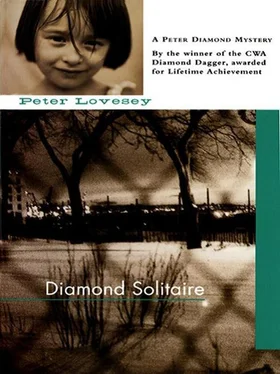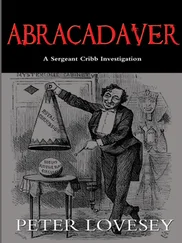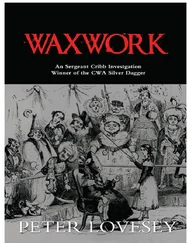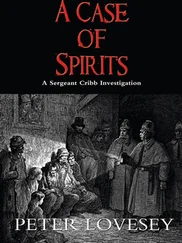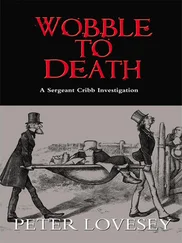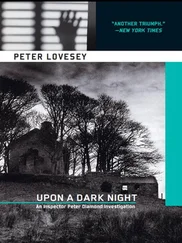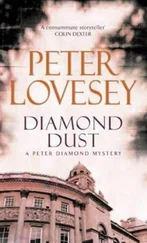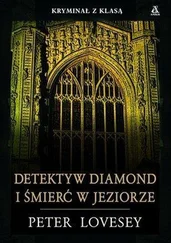Peter Lovesey - Diamond Solitaire
Здесь есть возможность читать онлайн «Peter Lovesey - Diamond Solitaire» весь текст электронной книги совершенно бесплатно (целиком полную версию без сокращений). В некоторых случаях можно слушать аудио, скачать через торрент в формате fb2 и присутствует краткое содержание. Жанр: Полицейский детектив, на английском языке. Описание произведения, (предисловие) а так же отзывы посетителей доступны на портале библиотеки ЛибКат.
- Название:Diamond Solitaire
- Автор:
- Жанр:
- Год:неизвестен
- ISBN:нет данных
- Рейтинг книги:4 / 5. Голосов: 1
-
Избранное:Добавить в избранное
- Отзывы:
-
Ваша оценка:
- 80
- 1
- 2
- 3
- 4
- 5
Diamond Solitaire: краткое содержание, описание и аннотация
Предлагаем к чтению аннотацию, описание, краткое содержание или предисловие (зависит от того, что написал сам автор книги «Diamond Solitaire»). Если вы не нашли необходимую информацию о книге — напишите в комментариях, мы постараемся отыскать её.
Diamond Solitaire — читать онлайн бесплатно полную книгу (весь текст) целиком
Ниже представлен текст книги, разбитый по страницам. Система сохранения места последней прочитанной страницы, позволяет с удобством читать онлайн бесплатно книгу «Diamond Solitaire», без необходимости каждый раз заново искать на чём Вы остановились. Поставьте закладку, и сможете в любой момент перейти на страницу, на которой закончили чтение.
Интервал:
Закладка:
"Miss Musgrave. Of course!" He stepped forward, compelling her to stand aside. "Peter Diamond, General Help, here to speak to Miss Musgrave."
She succeeded in saying, "You have an appointment." If she meant it to sound like a question, as she probably did, the attempt was foiled by a huge, disarming grin from Diamond. The upshot was that Mrs. Straw's utterance ended on a descending note and became a statement She added, "Miss Musgrave is very busy."
"Don't I know it!" Diamond said.
"You know Miss Musgrave?" she said with relief.
He shrugged like a Frenchman in a way that could mean everything or nothing. "She'll see me, I think." He was in the hall now and Mrs. Straw was closing the door. From the depths of the house came the cries of children. "She's not in class, is she?"
"If you'd only wait, I'll tell her you're here."
At that moment a face appeared around a door halfway up the hall. Diamond called out, "There you are, Miss Musgrave."
It wasn't a stab in the dark. The face was weighing him up with the look of a person in authority.
"Peter Diamond," he told her, advancing with his hand extended. A man of his size in motion isn't easy to stop. "Mrs. Straw here was telling me how busy you are, but perhaps you can spare me a minute. I'm not selling anything."
Miss Musgrave must have been in her thirties, tall and slim, with blonde hair drawn back to a small ponytail and tied with a black ribbon. She didn't immediately accept the handshake. She asked, "What is this about, then?"
He beamed. "It's about one of the children, the Japanese girl. I may be able to help."
"You'd better come in."
Her office evidently doubled as a classroom. There were three infants' chairs and tables. Her own desk had a lineup of painted masks made from egg boxes. The floor was spotted with paint. A menagerie of stuffed animals sat on the filing cabinet. Children's paintings ranging from competent to inept were taped to the walls. Diamond found it congenial. In the absence of a spare adult-sized chair, he perched himself on a wooden chest with a flat lid that he reckoned would take his weight.
Miss Musgrave asked if he wanted a coffee. She had a full cup on her desk.
"No thanks. I really don't mean to be a nuisance." At this stage he judged it wise to throw himself on her mercy. "I used to be in the police as a detective superintendent. Used to be. I must make it plain that I'm here in a private capacity." He explained about losing the Harrods job. "I saw the little girl that night, and I'm appalled that after-what is it? Six weeks? -her people haven't been found."
"I'm sure the police are doing their best," Miss Musgrave said.
"No question of that."
"Meanwhile we're making her as comfortable as we can. She does need specialized care. That's my province, Mr. Diamond." She sounded defensive, yet well in control. From the guarded looks she was still giving Diamond, she hadn't much cared for his steamroller tactics in gaining admittance.
"It's not easy, I imagine, when a child doesn't speak at all," he ventured.
"We deal with a variety of problems here."
"With limited resources, no doubt."
"If you're hinting that Naomi isn't being given the attention her predicament deserves, Mr. Diamond, you're mistaken. She's been the subject of the most intensive tests and inquiries."
"Naomi-you know her name?"
Miss Musgrave shook her head. "We have to call her something. One of the staff from the Japanese Embassy suggested it as a name that their people and ours have in common."
"Naomi. That's Japanese? I thought it was Old Testament."
Hosanna! His early days as a choirboy paid off. Miss Musgrave's expression softened. A man who knew his Bible couldn't be wholly disreputable. "What exactly are you here for, Mr. Diamond?"
"To help the kid find her people."
"Oh-and how will you succeed when everyone up to now has failed?"
"By being the Sherlock Holmes round here-except that I come free."
"That's fine as far as it goes, but I don't know what the police would say about it."
"The police are up shit creek without a paddle, as Sherlock used to remark to Dr. Watson."
She put her fingers to her mouth, possibly, Diamond suspected, to hide a faint smile.
He pointed to the cup and saucer on her desk. "Your coffee's getting cold."
She lowered her hand and she was definitely smiling. "It's Bovril. Is that an example of your detective skills?"
He made a pistol shape with his fingers and held them to the side of his head.
Miss Musgrave, serious again, said, "Naomi can't answer questions, so I don't see what good you can do."
"I can observe."
"And make deductions?" She mocked him with her eyes.
"You've got to admit the kid needs help."
This was a telling point with Miss Musgrave. She took a long sip of the Bovril. "If you're serious, come back at two this afternoon. I'll be taking the autistic class. In this room. You can come in and see what happens. Then perhaps you'll understand the difficulty."
An adult-sized chair had been installed just inside the door for Diamond. It wasn't possible for a man of his bulk to be unobtrusive in an office so small, but Miss Musgrave didn't mind and the children scarcely gave him a passing glance. They were shepherded in by Mrs. Straw and another woman who looked mightily relieved to be handing them over.
One of them, a boy, was screaming, as if in rage rather than pain. On entering the room he broke away from Mrs. Straw, ran to a bookcase, swept the bottom shelf clear of books and squeezed into the narrow space underneath, where he continued to scream.
"That's Clive," Miss Musgrave told Diamond above the racket. She made no move to restore the books to their places or to calm Clive. "And this is Rajinder."
Rajinder moved erratically, with a springy step, both arms flexed and his wrists limp. He went to one of the infant chairs and sat there, rocking, it seemed, in time to Clive's screaming.
"Come on, you two," the second teacher urged the rest of the class, who seemed reluctant, not without cause, to enter. "Tabitha, Naomi, we can't wait all day for you." She cupped her hand around the back of one child's head and drew her in, a pale, worried-looking girl of about seven with fine blonde hair, presumably Tabitha. She had thick plastic glasses fastened with a band around the back of her head like a tennis player's. She had scarcely taken a step into the room when Miss Musgrave remarked to the other teacher, "She needs changing. Do you mind?"
Tabitha was recalled and Naomi was ushered forward in her place. Diamond had seen the child briefly that night in Harrods, and remembered how impassive she had looked, surrounded by security guards. This morning she had the same preoccupied expression, as if her eyes saw nobody. There was clearly a level at which her mind was functioning efficiently, because she moved normally, straight to a chair and sat down, composed, indifferent to Clive's screaming and Rajinder's rocking, or to the presence of the adults. Someone had fastened a white ribbon in her hair and she was in a red corduroy dress, black tights and trainers. "She'll stay like that for as long as I let her," said Miss Musgrave. "I can get through to the others. Outwardly they appear more disturbed than Naomi, but she's inaccessible, and it isn't just the problem of language. It must be some form of autism."
Diamond had seen television programs about autistic children who appeared physically normal, but tantalizingly locked in their inner worlds. They exhibited a range of behavior that could include tantrums, grimacing, avoidance of all human contact, inappropriate emotional reactions such as laughing when someone else was hurt and, in rare cases, strange feats of memory enabling them to play music they had heard only once before, or doing complex drawings of scenes and buildings only briefly visited. From what he remembered, there was controversy about how autism should be treated. He'd watched a disturbing film of mothers forcibly embracing their struggling children until they stopped resisting, which could take hours. In some cases, the results had been encouraging.
Читать дальшеИнтервал:
Закладка:
Похожие книги на «Diamond Solitaire»
Представляем Вашему вниманию похожие книги на «Diamond Solitaire» списком для выбора. Мы отобрали схожую по названию и смыслу литературу в надежде предоставить читателям больше вариантов отыскать новые, интересные, ещё непрочитанные произведения.
Обсуждение, отзывы о книге «Diamond Solitaire» и просто собственные мнения читателей. Оставьте ваши комментарии, напишите, что Вы думаете о произведении, его смысле или главных героях. Укажите что конкретно понравилось, а что нет, и почему Вы так считаете.
